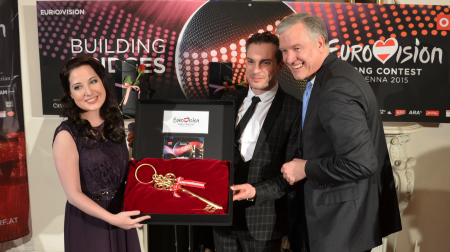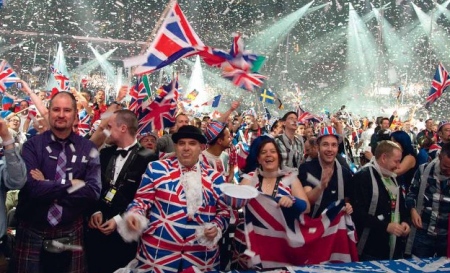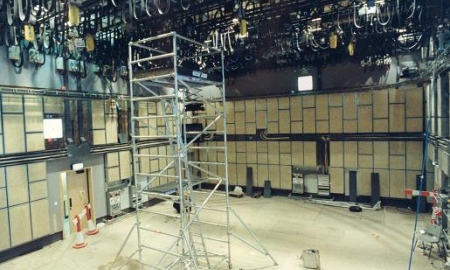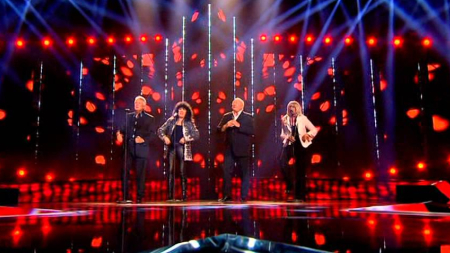The biggest ever song search! Eurovision community involvement! The public has ‘the final say’! Suddenly the BBC has delivered what many in the United Kingdom and beyond have asked for. There again, perhaps not. Ewan Spence wonders if anything has actually changed at all.
The Big Song Search is on! The BBC team has revealed its plans to select the United KIngdom’s entry to next year’s Eurovision Song Contest, and it makes for some very interesting reading, especially if you’re the sort of person who looks beyond the quotes and emotion to what is actually going in inside New Broadcasting House. Put aside the wind machine full of glitter, set down dreams of a new tomorrow, the BBC is using the same process as last year. Nothing has changed!
It Really Is All Up To The Public
Actually that’s not true, there’s one change that should be noted, and that’s the involvement of the public in the selection process. Once a longlist from the open submissions is created, and a subsequent shortlist has been decided on, the final list will be “presented to a professional panel and the public, who will have the final say.”

Electro Velvet at the UK Embassy
If you look back at coverage over the last few years, the biggest noise in the media (more mainstream media than online it has to be said) is about the BBC imposing a decision on the public and being completely out of touch. Fraser Nelson for The Spectator.
…the [modern] BBC has failed to produce a Eurovision winner: its bureaucrats are the ones choosing the British entry, and they get it wrong every time. Graham Norton and Paddy O’Connell are superb, funny and knowledgable hosts; I have nothing but praise for how the BBC actually covers Eurovision. But it’s time the BBC subcontracted the job of actually picking the UK entry, because it’s horribly clear that, as an organisation, it just does not know how.
Anyone who works in a large organisation knows that the secret of career advancement is not to be left with the sticky wicket of blame when (literally) the music stops. The decision to go with Electro Velvet, Molly, Bonnie Tyler, and Englebert Humperdinck lies on a desk inside the BBC. Whatever happens this year, that blame will fall either on the public or the professional panel. Watch carefully for ‘the public will choose’ to be emphasised at every possible moment to get the deflection ready if needed. Even considering the public voting element, there’s still a huge amount of influence that the BBC could bring to bear on the selection shortlist that is presented to the public if it wished.
Selecting The Song
Let’s wind back the clock to last year, and the BBC’s Guy Freeman writing on the submission process for Vienna 2015. We all know now that Electro Velvet was submitted through the open call, but at the time that was not the only option available. Advice would be taken from other organisations, other departments of the BBC, and the open submission was simply another potential route.
We’re keen to provide as many routes into the selection process as possible, whilst remaining realistic about the proven amount of experience required by anyone wishing to put themselves forward. As we did last year, we will continue to talk to record labels and organisations who work with songwriters and artists every day – such as BBC Introducing – to suggest or create viable entries.
The 2015 process is no different to the 2014 process in terms of submitting and sourcing songs. The difference is that the routes are better defined in advance.
The first, which will draw the headlines, is the open submission process which broadly follows the same path as last year. Once this process closes on November 20, the BBC will work to cut down these entries to a long list. Here they will be asking OGAE UK to be involved. One interesting point here is that if OGAE ask the Schlagerboys to rank the songs, and then asks Roy Delaney and myself to rank the songs, there’s going to be a difference of opinion… unless Alcazar send some 70s Prog Rock Fusion number, which would be nice.
It’s worth noting here that OGAE UK’s involvement is only going to be to help build the list from the submitted songs, and there will be another shortlisting process following this period. Just because a song is voted down by OGAE UK does not mean it won’t be reinstated at a later stage. If the powers that be want a certain song or performer on the final shortlist, it’s going to be there.

OGAE UK in full flow
The press release highlights a route for songwriters to be involved with the British Academy of Songwriters, Composers, and Authors running its own song contest. Anyone who knows the history of the BBC and the selection process in the eighties and nineties will recognise the connection, although it’s not clear how a winning BASCA song will be involved in the process. If I had to speculate the top BASCA songs would go straight to the final shortlisting process and be paired up with promising singers from the open submission process.
Finally Hugh Goldsmith is called out as a named liaison to “in order to encourage high-level music industry involvement”. Noted in the press release for his involvement with Innocent Records, but it’s worth highlighting that he left Innocent in the middle of the last decade with his last musical credit being in 2005. And the use of the word encourage is not… encouraging.
No National Final Just Yet
As for the final shortlist and the subsequent National Final many in the UK Song Contest Community are looking forward to… stop. There is no indication that a televised National Final is going to happen. All that has been said is that the final shortlist will go to a professional panel and the public – who will have the final say. How that final say is going to happen “will happen in due course.” Not “details of transmission will be published.”

The 2012 UK National Final… an empty BBC Studio A
ESC Insight has confirmed with the BBC that everyone will have to wait for “further announcements” to be made. Yes, that could mean a televised show, but it could be a week of single appearances on The One Show, a phone vote during the Ken Bruce Radio 2 Morning Show, or even an online poll on the BBC Website mimicking the Swiss process.
There’s also how the song will be judged by the panel and the public. Take Malta’s selection process for Vienna, which has a public and jury vote where the jury has a stunning eighty three percent of the vote. We can assume the BBC will go 50/50, but the devil will be in the detail. If the public is really going to have the final say, then the implication is that the panel will not be able to overrule the public… in which case why have them?
Without knowing how the final shortlist will be drafted, presented or judged, or even the skew between the public and the panel scores, it’s hard to say just how much of an influence the public will have.
Transparency And Trust
Last year the BBC asked external organisations for potential entries, sifted through a pile of submitted songs, sat around in a room, and selected a song.
This year the BBC is asking external organisations for potential entries, asking OGAE to sift through a pile of submitted songs (before it sifts through them again), and then selects a few favourites to go forward and have one of them chosen by a process as yet unknown.
If there was the inclination to do so, the voting public could be guided to a specific song – dare I remind you of John Barrowman’s enthusiastic “That’s so Eurovision!” as he promoted Scooch to the UK public as the only song worth picking (before you ask, he was wrong). Looking at other Reality TV shows it’s clear that the toolset is available to promote one choice over another if a production team so wish. From the running order and the choice of camera angles, to the review comments of a panel and the introductory VT, its hard to create a truly level playing field for a song contest.

DMGP 2013: Brotherhood Of Man
The process of Eurovision 2016 certainly suggest a more open approach with a lack of ‘managers deciding in a darkened room’ and Guy Freeman should be applauded for lifting the process towards the light. But it’s not enough to be transparent and open, it needs to be continually demonstrated at every stage of the process. Confidence in the BBC’s selection process has fallen over the last few years, and while today’s press release offers a new twist on the same process, the trust that was lost cannot be earned back with a single piece of paper.
Here at ESC Insight we’ve seen nothing to suggest that the BBC is going to play this with anything but a straight bat, and if so then the long process to rebuild trust in the BBC’s Eurovision Song Contest approach from the music industry, the mainstream media, and the general pubic, has begun.









I think you’re being very negative, Ewan.
The application process isn’t exactly the same as last year as they’re getting the BASCA involved again, which should mean songwriters of a higher calibre enter.
Also, getting a respected music industry exec in Hugh Goldsmith, who has a history of being very successful in pop A&R is going to help enormously. He’s bound to use his contacts to encourage talent to enter. It’s a bit vague on what the BPI are going to do, but any involvement from them should also help too.
You’re right that they haven’t announced a national final yet, but that doesn’t mean there won’t be one – and if it is does end up being on The One Show or online, then I don’t really care. The important thing is that they are doing everything they can to get good songs entered, and we’ll get a say in the one that goes to Eurovision. I don’t think we can ask for much more really.
I think we’re wise to be cautious whenever we read press releases from a beauracracy but whatever way this shakes out, it looks like a significant improvement on recent years. You fail to explain why a vote on The One Show or Radio 2, the most-listened to station in the land, would be less desirable than a Song For Europe type show, which would only be watched by Eurovision diehards. I don’t see in what world a poll being opened up to a wider audience be considered less democratic.
Ben, partly consider the article as counterpoint to the joyous enthusiasm, but one swallow does not make a summer. The BBC reached out last year and the year before to songwriting and music organisations, so there’s no change there. And show me Goldsmith’s relevancy in 2015, not 2005.
As for the NF, it doesn’t mean there will be one either.
Am I optimistic? Yes, but I’m also wary, I’ve seen good intentions, and I;ve seen over promising and under delivering. I’ll stay that way till something actually happens.
ASFE remains a far better ‘replica’ of the environment than the One Show podium, or the audio-only experience of Radio 2. We need to see what people can do in the environment they will contest.
The bottom line is the song.If the song is good, no one will remember how it was chosen.If the song is bad or the singer can’t deliver, than the complaints about the mechanism of choosing the song, will rise again.
And I’ll repeat what I said last year in your article regarding the same issue: The way it looks, the UK will have some sort of NF in the future.It may not happen this year, but it will happen in the long run. Guy Freeman will never say it openly, but the steps he takes, suggest just that
Indeed, the steps are there to build up – right now the key is trust and respect from the music industry IMO.
I think it would help enormously if the e-mail address the BBC have supplied for those interested..actually worked. The e-mail is not recognised. Having sent many requests for them to rectify the issue (Via the BBC site and Facebook)…nothing..silence…Let’s hope they fix it before November 20th!!
Danny